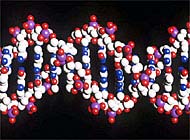
Louis-Jeantet Prize winners chosen

Switzerland's prestigious Louis-Jeantet Prize for Medicine has been shared this year among a Frenchman, a Scotsman and a German. The three will use the SFr1.8 million ($1.1 million) in prize money to carry out new research projects.
The Louis-Jeantet Foundation, based in Geneva, has named Alain Fischer, an immunologist, Iain Mattaj, a molecular biologist, and Alfred Wittinghofer, a biochemist, as this year’s winners.
Fischer is professor of paediatric immunology at the Necker Hospital in Paris; Dr Iain Mattaj is scientific coordinator at the European Molecular Biology Laboratory in Heidelberg, and Alfred Wittinghofer is professor of biochemistry and director at the Max-Planck Institute for Molecular physiology in Dortmund.
Dr Lukas Kühn, secretary of the science committee of the Louis-Jeantet Foundation, says this year’s winners “were chosen for having made the most impact on medical research in Europe”.
He said: “Each has made a major contribution in his field. Alain Fischer has recently been able to cure, by gene therapy, children with immune defence diseases and this is a major step forward in medical research. Iain Mattaj is a fundamental researcher in the transport of proteins and RNA out of the cell nucleus to the cytoplasm.
“Alfred Wittinghofer studies the structure of proteins and he has found how some of these proteins are changed in their function and create cancer in our cells.”
It’s no easy task choosing the winners of the Louis-Jeantet Prize. The 70 original applicants were whittled down to 12 by a committee of scientific experts across Europe before the three winners were eventually chosen.
“I work in basic biological research,” said Mattaj, who’s originally from Scotland. “One of the important questions in basic biology is how individual cells are broken down into different compartments.
“My research has been mainly on the topic of how the nucleus of a cell is defined and how it’s built up. The nucleus is a very important part of the cell because it’s the part of the cell in which the genetic information is contained and where all of the genetic information is both read out and also duplicated so that our cells can be duplicated and can divide.”
The prize winners will get SFr600,000 each for their laboratory to further their projects. In addition they will each receive a personal award of SFr100,000 Swiss francs. Dr Mattaj said the prize money will help his research enormously.
“Without the money we would only have been able to proceed in very limited way. We’ve been looking at connections between the DNA, which is arranged inside cells in chromosomes and the membranous envelope structures, which surround the DNA and make the nucleus and thereby separate the DNA from the rest of the cell.”
The prize winners will join illustrious company, including Luc Montagnier, who discovered the Aids virus, and Rolf Zinkernagel and Christiane Nüsslein-Volhard, who have both gone on to win Nobel prizes.
Kühn says that’s exactly what the Foundation is aiming for. “It is the goal of the Louis-Jeantet Foundation to further the high quality of scientific research and in the long term really get the best-talented people to do still more for the benefit of everyone.”
by Vincent Landon

In compliance with the JTI standards
More: SWI swissinfo.ch certified by the Journalism Trust Initiative

























You can find an overview of ongoing debates with our journalists here . Please join us!
If you want to start a conversation about a topic raised in this article or want to report factual errors, email us at english@swissinfo.ch.